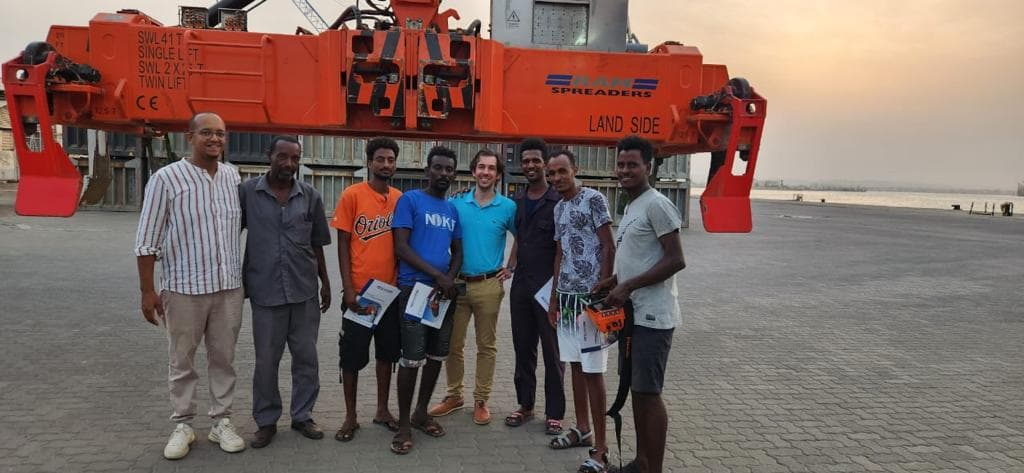RAM is no stranger to offering customers the best care and support, even in remote locations with limited internet and services.
Javier Cazin, regional manager for RAM, travelled to the Massawa Port in Eritrea to deliver practical training for their port technicians, who recently took delivery of RAM’s heavy-duty twin lift mobile harbour crane spreader.
Situated in Northeastern Africa, the port is strategically located near major shipping routes on the Red Sea, the southern entrance to the Suez Canal and the ports of Saudi Arabia and Yemen. Despite its strategic location, the port is close to a mountainous region, with limited internet and phone access, and is within a desert environment. Hence, port equipment suffers from prolonged exposure to dust.
RAM offers reliability with first-class after-sales support
RAM has a solid reputation for manufacturing and supplying port equipment in harsh and demanding environments, particularly across the Middle East and Sub-Saharan Africa, now with Massawa Port included as no exception.
Massawa Port chose RAM on this basis, who could also deliver practical on-site training in operational and preventative maintenance of their RAM MHC twin lift spreader.
Moving on up
As the port staff had minimal resources for container handling and no access to the internet, they were eager to learn: about the industry as a whole, how they performed compared to other MHC operating terminals and how they could improve their operations.
With an impressive 26 container moves per hour, the Massawa Port wanted to continue producing the same productivity levels without compromising the quality of their MHC spreader.
The training session consisted of real-life operational scenarios and how to conduct regular and preventative maintenance, allowing the port to become better equipped with optimizing lift-cycle operations and prolonging the lifespan of the spreader.
Towering above the rest
The port was impressed with the RAM MHC, with the reduced frictionless design of its ‘centre-of-gravity’ tower construction and its ability to require minimal lubrication and electrical cable protection—all features allowing operations in dusty environments.

Support when you need it
The port also took note of RAM’s reputation for regional aftersales support. RAM had previously worked alongside the Sogester container terminal to design and develop a heavy-duty MHC container spreader to meet their needs and help them achieve their targets.
After reflecting on the support given to terminals like Sogester and the design features of the RAM2740, the Massawa Port Authority chose RAM, which has spare parts hubs at strategic locations, including Dubai.
No limits
Not having access to a telephone signal, as well as the total absence of an Internet connection, did not deter Javier from providing the port with first-class service and support.
On arrival, Javier received a warm welcome from the people of Eritrea. He was pleasantly surprised with the Massawa Port Authority’s technical team, who was proficient in English, eager to learn and well-skilled in container handling.
Javier added on his return from Eritrea,
“Getting to the port of Massawa was a challenge, but the team at Massawa Port made it worthwhile. Working with the team, who were keen to learn new maintenance techniques and share their experiences working in such a demanding environment, was an absolute pleasure”.
Frequently Asked Questions
What kind of training did RAM Spreaders provide to Massawa Port?
RAM Spreaders provided practical on-site training in operational and preventative maintenance of their RAM MHC twin lift spreader.
What were the challenges faced by Massawa Port?
The port staff had minimal resources for container handling and no access to the internet. The port is situated in a desert environment with limited internet and phone access, which results in prolonged exposure to dust for port equipment. Their training with RAM spreaders helped ensure they were ready for container handling operations and maintaining their spreader.
What did Massawa Port want to learn from RAM Spreaders?
The port staff wanted to learn about the industry as a whole, how they performed compared to other MHC operating terminals, and how they could improve their operations.

